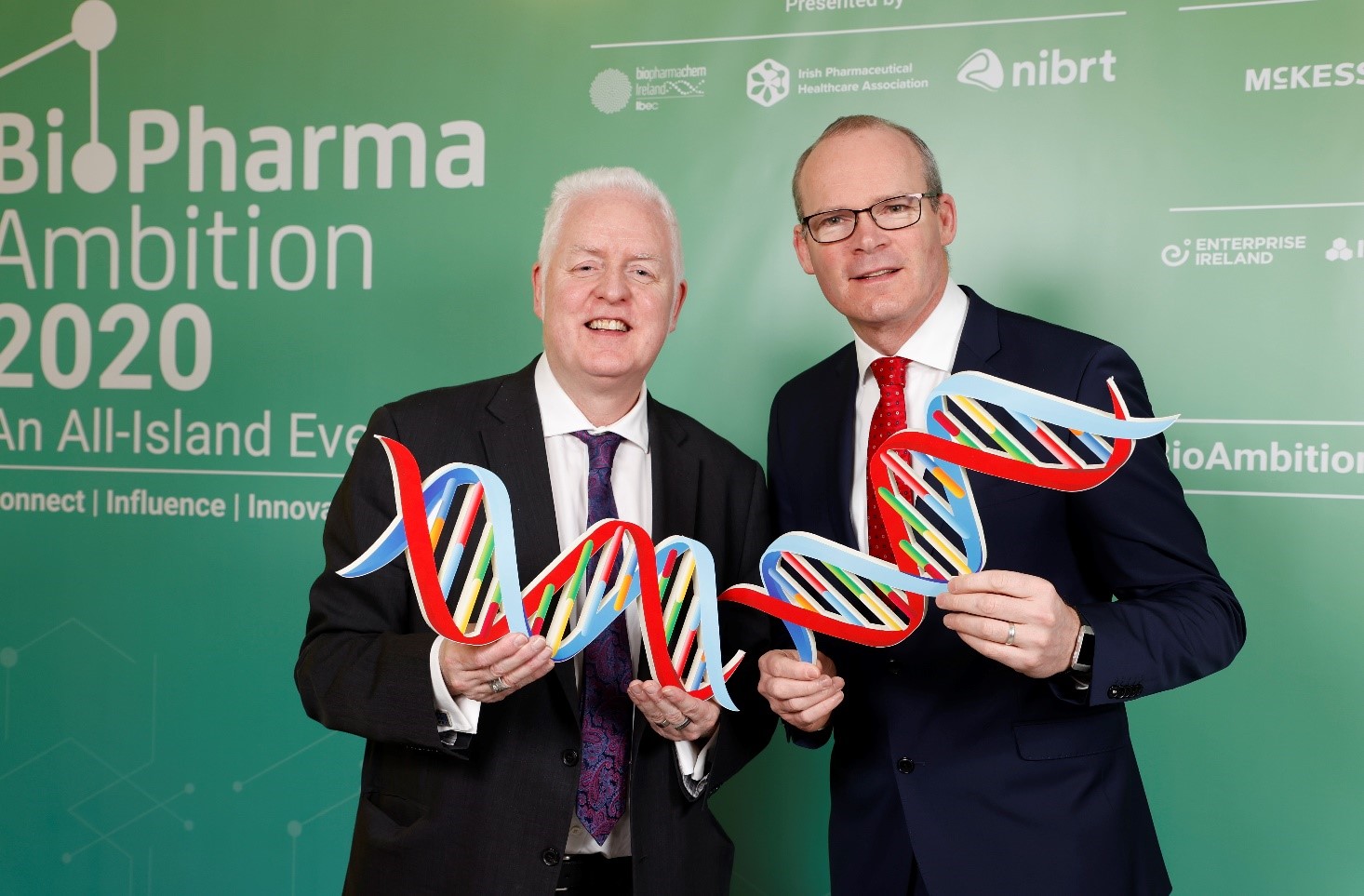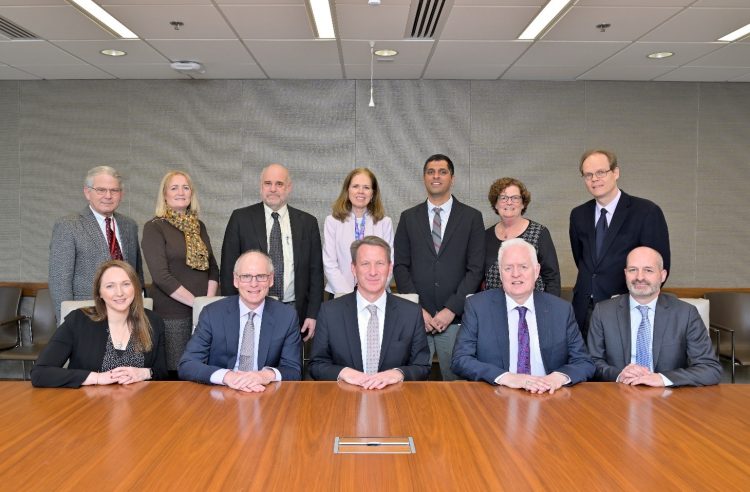Cancer doesn’t respect political borders – why should we?
Following the launch of a study highlighting how the All-Island Cancer Consortium has increased the quantity and enhanced the quality of cancer research on the island of Ireland, Professor Mark Lawler calls for an All-Island Cancer Research Institute.

Professor Mark Lawler pictured with Mr Simon Coveney, Tanaiste (Deputy Prime Minister) and Minister of Foreign Affairs who launched the recent BioPharma Ambition 2020 All-Island Conference.
On Friday 13th March 2020, ahead of the North-South Ministerial Council in Armagh, the Taoiseach (Irish Prime Minister) Leo Varadkar said “This virus (COVID-19) knows no borders, no nationality. It is a problem for all of us”. It echoed a statement that I made in the same room in Armagh, just two weeks previously to a group of stakeholders representing governmental, non-governmental, academic, clinical and patient organisations from Ireland and Northern Ireland. My statement “Cancer doesn’t respect political borders… why should we?” was made in the context of a disease that currently kills approximately 13,500 people annually on the island of Ireland and a unique cross-border activity that has been ongoing on this island for more than 20 years.
The signing of the Belfast Agreement (more commonly known as the “Good Friday” Agreement) on the 10th April 1998 has been truly transformational for the island of Ireland. However, in addition to creating a lasting peace that has delivered significant political, social and economic benefit, the Agreement also provided the environment for the creation of a unique tripartite partnership that has provided unrivalled opportunities for enhancing the health of citizens on the island of Ireland. In October 1999, a Memorandum of Understanding (MOU) was signed at Parliament Buildings at Stormont in Belfast between representatives of the governments of Ireland and Northern Ireland, and the world-renowned US National Cancer Institute (NCI) in Washington DC. This formed the centrepiece of an NCI All-Ireland Cancer Conference, which attracted a stellar cast of international cancer experts to Belfast. I was fortunate enough to be part of that inaugural conference and my memories of its quality, significance and ambition persist to this day, more than 20 years after the event.
The MOU signed at Stormont formed the basis for the All-Ireland Cancer Consortium (AICC), a tripartite partnership that aimed “to reduce cancer incidence and mortality on the island of Ireland through cross-border and transatlantic collaborations in cancer research and education”. AICC was the brainchild of Professor Patrick (Paddy) Johnston, a native of Derry and a UK leader in cancer research, who had worked at the NCI previously and recognised the significant opportunity that such a tripartite partnership could bring to enhance cancer research and improve patient care on the island of Ireland. At the time, Paddy was Director of the Centre for Cancer Research and Cell Biology (CCRCB) at Queen’s University Belfast, subsequently becoming Dean of the School of Medicine and ultimately Vice-Chancellor and President of Queen’s, which he led with passion and commitment until his untimely death on the 4th June 2017. CCRCB was recently renamed The Patrick G Johnston Centre for Cancer Research in his memory.
This month, we published a groundbreaking study which demonstrates the benefit of this unique Ireland – Northern Ireland – US partnership, highlighting how AICC has increased the quantity and enhanced the quality of cancer research on the island of Ireland. The results generated through this tripartite research effort have contributed to the saving of thousands of lives and underpinned the enhancement of the quality of life experienced by many thousands of others afflicted by cancer and its sequelae. Collaborative cancer research on the island of Ireland has doubled, the quality of the research and its impact have increased significantly when compared to other European countries, while researchers from the island of Ireland are now publishing joint scientific papers with the very best scientists from the most prestigious US institutions. Indeed Dr Bill Dahut, Clinical Director of the National Cancer Institute, highlighted the importance of the AICC research efforts when he said at a joint meeting with senior leadership at the NCI (see picture above) that “Ireland and Northern Ireland are now firmly embedded on the global cancer research map”.

Prof Mark Lawler (Front Row 2nd from Right); Ms Eibhlin Mulroe (Front Row 1st from Left, CEO Cancer Trials Ireland); Prof Austin Duffy (Front Row 1st from Right, Mater University Hospital and University College Dublin) and Ms Grainne Lennon, (Back Row 2nd from Left, InterTradeIreland) with Dr Ned Sharpless (Front Row, Centre, Director NCI); Dr Bill Dahut (2nd from Left, Clinical Director NCI) and other senior leadership of NCI, discussing the next 21 years of AICC and the potential for an All-Island Cancer Research Institute.
Critically, the research has also delivered significant clinical impact for cancer patients on the island of Ireland. Before 1999, access to cancer clinical trials was extremely limited, but a key output of AICC was the establishment of a robust cancer clinical trials infrastructure, so that patients from Ireland and Northern Ireland could be treated with the most novel therapeutic approaches. Since 1999, over 35,000 cancer patients on the island of Ireland have participated in clinical trials, often benefitting from access to the very latest innovative medicines. This simply would not have happened at the pace and scale that it has occurred, without the infrastructure provided through AICC. Groundbreaking trials such as the NCI’s TailorX, in which 690 women from Ireland participated (one of the largest recruitment of patients from an individual region worldwide), demonstrated that chemotherapy can be avoided by 70 per cent of women with the most common type of early stage breast cancer, thus allowing these young women to avoid the side effects of their treatment and preserve their quality of life.
AICC has been a truly inter-sectoral collaborative effort, with robust cooperation between the governments of Ireland and Northern Ireland, the universities, hospitals and the public sector, supported over the last 21 years by the Health and Social Care Research & Development Division, Public Health Agency Northern Ireland, the Health Research Board of Ireland and the Irish Cancer Society. Organisations such as Cancer Trials Ireland, the Northern Ireland Cancer Trials Network (NICTN), and InterTradeIreland have been working together to increase availability of modern innovative clinical trials, giving increased hope to cancer patients across the island of Ireland. But we need to do more, particularly as our ageing population will lead to at least a doubling of cancer incidence on this island by 2050.
I have been fortunate to experience the benefits of AICC from both sides of the border. I was chair of the Scholar Exchange Group of AICC during my time as an academic at Trinity College Dublin. The education and training benefits of AICC were huge, with over 500 clinicians, scientists, nurses and allied health professionals receiving specialist training at the NCI and in NCI-affiliated institutions in the US and then returning to put this knowledge and expertise into practice to advance cancer research and help cancer patients on this island. During my last seven years here at Queen’s, I have led a number of national and international cancer-focused initiatives with an all-Island input.
On World Cancer Day 2014, we launched the European Cancer Patient’s Bill of Rights (BoR), a catalyst for change and an empowerment tool for cancer patients, in the European Parliament in Strasbourg. The BoR was translated into 17 different European languages and adopted in 25 European countries. Such was its impact that it received the prestigious European Health Award in 2018 at the European Health Forum Gastein, the premier European event on healthcare delivery and health policy. My only regret as I went up to receive the award was that my friend, mentor and colleague Paddy Johnston could not have been there beside me. However, I imagine that proud Irishman looking down on this proud Irishman as I received the award, not just on behalf of the cancer patients on the island of Ireland, but on behalf of cancer patients on the entire continent of Europe. We may be a small island on the westerly extremes of that continent, but our leadership of pan-European initiatives with impact such as this one shows that we most definitely punch above our weight.
We will celebrate the 21st birthday of AICC in a special conference in Belfast in December 2020. But what about the next 21 years? Given the UK’s exit from the EU, the results of our study highlight that approaches that ensure sustained cooperative cancer research activity between Ireland and Northern Ireland can yield significant benefits for researchers, health systems, the economy and most importantly citizens on the island of Ireland and must be proactively pursued. As I said, Cancer knows no political borders… why should we?
What we need is an All-Island Cancer Research Institute, which I articulated at the recent Biopharma Ambition Conference in Dublin Castle. This Institute should be founded on excellent science and bring together the best minds to translate new knowledge generated into better prevention, earlier diagnosis, more innovative treatments and enhanced rehabilitation and return to normal living, thus delivering unrivalled benefit for citizens and society on the island of Ireland.
Dr Mark Ferguson, Director General of Science Foundation Ireland and Chief Scientific Advisor to the Government of Ireland has been a strong advocate for All-Ireland Research Centres. Imagine bringing together the combined strengths of researchers on this island to tackle a challenge such as cancer, linking in with our colleagues (including the Irish diaspora) in the US. Together, we could really make a difference in a disease that affects one in every two citizens on this island. We could act as a beacon to attract the best researchers in the world to the island of Ireland to address one of human health’s greatest challenges. We need to compete, not against each other, but against our common enemy… cancer.
Doing nothing or simply maintaining the status quo is not an option. By 2050, a patient on the island of Ireland will be diagnosed with cancer every 7 minutes. Put simply, The Time to Act is Now! We may be Small but we can do Big Things. Our citizens deserve action.
- The study referred to in this article was led by Queen’s University Belfast in collaboration with Kings College London, the Northern Ireland Cancer Registry, InterTradeIreland and Cancer Trials Ireland. The full paper entitled “The Good Friday Agreement and cancer research on the island of Ireland: Evidence for the impact of a tripartite cancer research partnership” is available here.
- Further information about the National Cancer Institute’s clinical Trial Assigning Individualized Options for Treatment (TAILORx) is available here.
- Click here to view a TedX Talk by Prof Mark Lawler.




